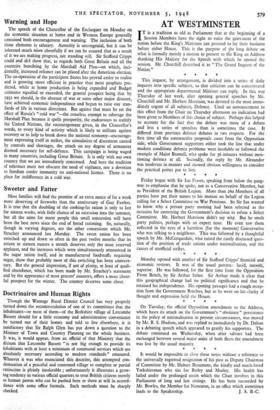Warning and Hope
The speech of the Chancellor of the Exchequer on Monday on the economic situation at home and in Western Europe generally contained both encouragement and warning. The inclusion of both those elements is salutary. Austerity is uncongenial, but it can be tolerated much more cheerfully if we can be assured that as a result of it we are making progress, not standing still. Sir Stafford Cripps could and did show that, as regards both Great Britain and all the countries benefiting by the Marshall Aid Plan—on which, inci- dentally, increased reliance can be placed after the American election. The co-operation of the participant States has proved easier to realise and is growing more efficient in practice than most prophets pre- dicted, while at home production is being expanded and Budget estimates equalled or exceeded, the general prospect being that by 1952 we should, in the absence of war or some other major disaster, have achieved economic independence and begun to raise our stan- dards of life in various directions. But against that must be set the effect of Russia's " cold war "—the ceaseless attempt to sabotage the Marshall Plan because it spells prosperity, the endeavours to stultify the United Nations, the encouragement given, in the Chancellor's words, to every kind of activity which is likely to militate against recovery or to help to break down the national economy—encourage- ment expressing itself in strikes, the stimulation of discontent caused by controls and shortages, the attack on any degree of armament deemed necessary for self-defence. This campaign is being waged in many countries, including Great Britain. It is only with our own country that we are immediately concerned. And here the tradition of tolerance must not obscure the need of vigilance, nor a devotion to freedom confer immunity on anti-national licence. There is no place for indifference in a cold war.










































 Previous page
Previous page